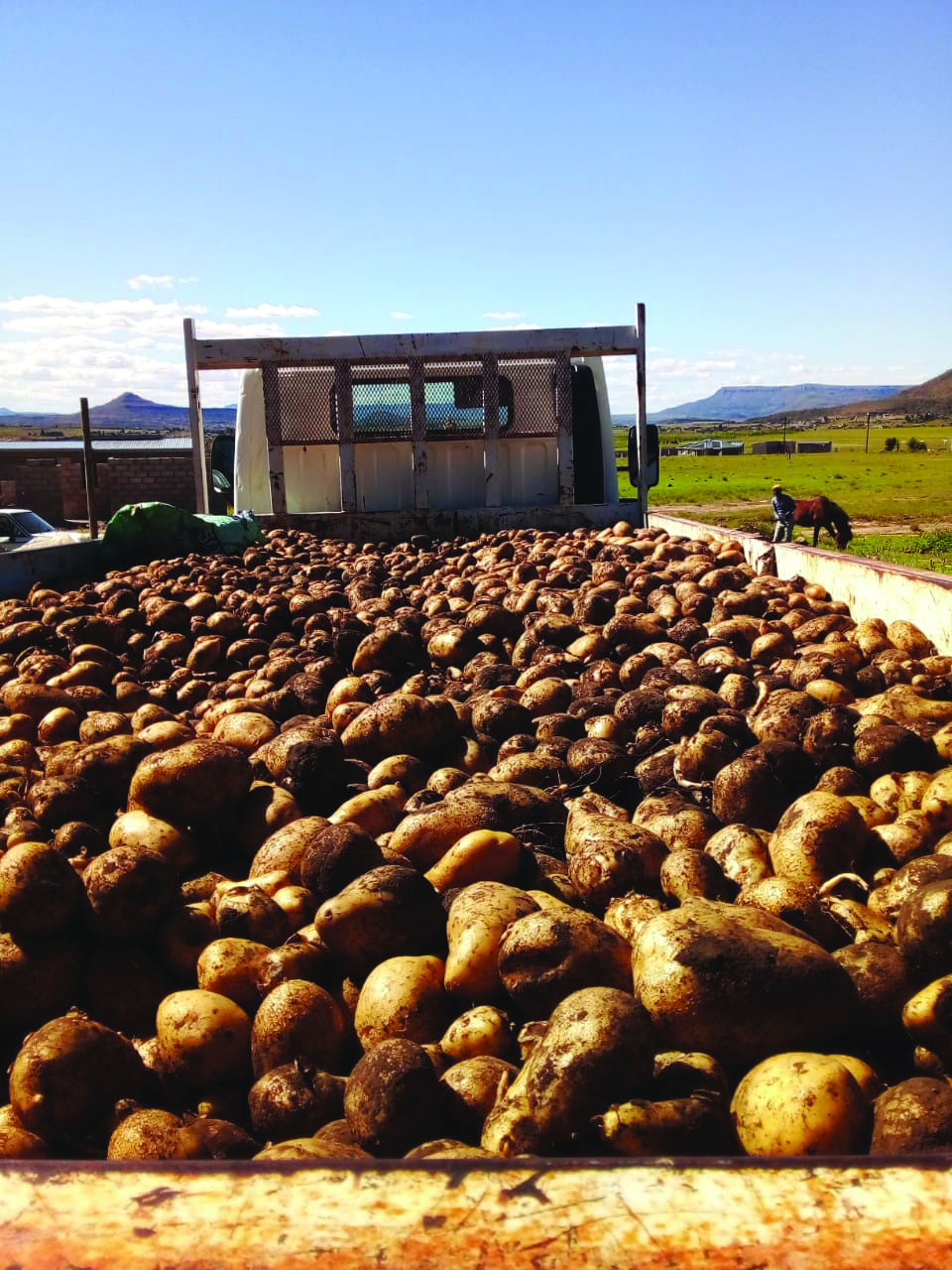By Lerato Matheka
Through a shared vision of innovation, sustainability, and resilience, the Potato Production Platform (PPP) is transforming the potato into a cornerstone of agricultural development. It aims to elevate the humble potato from just an agricultural product to a symbol of collaboration and ambition.
Over 100 farmers have united under the Potato Production Platform, a dynamic association dedicated to establishing Lesotho as a global leader in potato farming.
Formed in August 2023, PPP is committed to building a self-sustaining potato sector in Lesotho. This commitment was the focal point of its inaugural event, the Potato Summer Camp, where members gathered to reflect on their progress and strategize for the future.
The event brought together farmers, government representatives, and agricultural experts, creating a platform for dialogue and planning.
For the first time, members of PPP engaged directly with Agriculture, Food Security, and Nutrition Minister Thabo Mofosi, who attended the camp to pledge his ministry’s support for the association.
In his address, Minister Mofosi applauded PPP for its collective efforts and highlighted the association’s role in advancing Lesotho’s agricultural goals.
“You have given me hope, especially now at a time when Lesotho is working to position potatoes as its product of choice under the FAO’s One Country One Priority Product (OCOP) project. PPP is setting an example for collaboration and innovation.”
Lesotho has selected potatoes as a Special Agricultural Product (SAP) under the multinational programme known as the One Country One Priority Product (OCOP) Initiative. Potatoes were chosen as SAPs based on Lesotho’s competitive advantages, which include altitude, good quality soils, and adequate water for the production of this crop.
The Minister emphasised the funding opportunities available through the OCOP project, which supports investments in machinery, processing technology, and export readiness.
He assured PPP members that their collective structure would allow the Ministry to prioritise them for input disbursement and training opportunities.
However, Minister Mofosi did not shy away from acknowledging challenges.
He apologised for past delays in providing inputs and urged PPP to explore seed breeding as a means of achieving self-sufficiency.
“Lesotho needs a seed variety suited to our climate, and when we can produce our own seeds, self-reliance is guaranteed.”
One of the most inspiring moments of the camp was the recognition of young Rorisang Thamae, a budding farmer whose passion for agriculture stole the show. Initially invited to entertain, Rorisang’s dedication to farming captured the Minister’s attention.
Minister Mofosi pledged to personally support her journey by providing land, inputs, and machinery.
“Young people need motivation to appreciate and engage in agriculture. I will walk this journey with her and ensure her produce reaches the market,” the Minister said.
A significant segment of the event focused on the consumption and importation of potatoes in Lesotho, with insights provided by Boka Ts’abo from the Ministry of Agriculture’s marketing department.
According to Ts’abo, Lesotho remains heavily reliant on potato imports, with the following figures revealing the extent of the challenge:
- From January to March 2023: 70,719 bags valued at M2.6 million were imported.
- From April to June 2023: 97,793 bags valued at M3.8 million were imported.
- From July to September 2023: 83,178 bags valued at M3.9 million were imported.
- From October to December 2023: 73,979 bags valued at M9.6 million were imported.
“In total, Lesotho imported 325,669 bags of potatoes in 2023, valued at M19.9 million. Meanwhile, local production fell significantly short, with only 66 tonnes produced in 2023. Most of this production occurred between May and June, leaving gaps in supply for the rest of the year,” Tšabo said.
Tšabo highlighted the need for more consistent production and better coordination among farmers. “The task is enormous, but the opportunity to reduce reliance on imports and retain millions within our economy is even greater.”
PPP members and experts at the event outlined several challenges facing potato production in Lesotho, including:
- Access to Inputs: Delayed disbursement of fertilizers, seeds, and machinery.
- Land Ownership: Farmers struggle to secure and protect arable land for large-scale production.
- Climate Change: Unpredictable weather patterns are impacting crop yields.
- Data Deficiency: Limited access to accurate data on production and consumption hampers planning and market development.
- Lack of Seed Production: The absence of local seed breeding initiatives forces reliance on imported seeds.
Tšabo noted that while the ministry tries to help farmers address challenges, issues regarding access to land and data collection remain problematic.
Despite these challenges, the PPP remains optimistic. Chairperson Nthethe Ralitapole highlighted the importance of the Potato Summer Camp in fostering dialogue and building momentum for the future.
“This event was about introspection and planning,” Ralitapole said. “We celebrated our achievements, identified opportunities, and engaged directly with the Ministry of Agriculture. The Minister’s endorsement has motivated us to aim even higher.”
Ralitapole also emphasised the need for stronger policies to address land access issues and protect farmers’ investments. “We are confident that with the government’s support, we will see a major shift in potato production by next year,” he added.
The event featured practical advice from experts, including Louis Schutte of Bayagrow, a South African company specializing in pesticides. Schutte emphasised the importance of regular field inspections to ensure crop health, describing farmers’ physical presence in their fields as the “best pesticide.”
With Lesotho selecting potatoes as its product of choice under the OCOP initiative, significant opportunities lie ahead. The project challenges Lesotho to not only meet domestic demand but also to produce for international markets.
Tšabo outlined potential areas for growth, including: - Agro-Processing: Developing food and by-products from potatoes.
- Seed Multiplication: Establishing seed breeding programs to ensure a steady supply of high-quality seeds.
- Market Expansion: Strengthening value chains to access regional and international markets.
As the camp concluded with a farm tour and bonfire discussions on next steps, the sense of unity and purpose among PPP members was palpable. Minister Mofosi urged the association to continue working collectively and promised that his Ministry would prioritise policies and resources to support their efforts.
“The journey has just begun,” Mofosi said. “Together, we can transform Lesotho’s potato sector into a global success story.”
For PPP, the Potato Summer Camp was not just an event—it was a milestone. With strong leadership, government support, and a clear vision, the association is poised to lead Lesotho toward a future of agricultural excellence and self-reliance.
Summary
- By Lerato MathekaThrough a shared vision of innovation, sustainability, and resilience, the Potato Production Platform (PPP) is transforming the potato into a cornerstone of agricultural development.
- “You have given me hope, especially now at a time when Lesotho is working to position potatoes as its product of choice under the FAO’s One Country One Priority Product (OCOP) project.
- A significant segment of the event focused on the consumption and importation of potatoes in Lesotho, with insights provided by Boka Ts’abo from the Ministry of Agriculture’s marketing department.

Your Trusted Source for News and Insights in Lesotho!
At Newsday Media, we are passionate about delivering accurate, timely, and engaging news and multimedia content to our diverse audience. Founded with the vision of revolutionizing the media landscape in Lesotho, we have grown into a leading hybrid media company that blends traditional journalism with innovative digital platforms.









